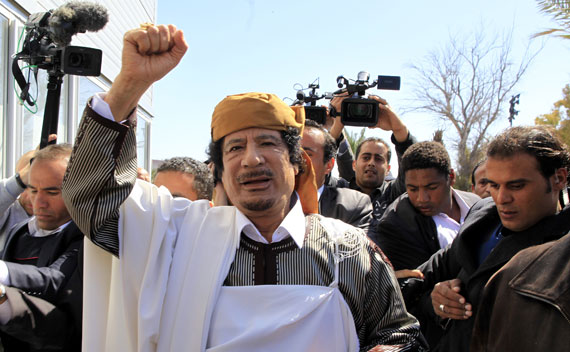What If Qaddafi Hangs On?
More on:

Much of the talk about Libya over the past week assumed that Col. Qaddafi was about to be swept from power. I have had several conversations recently in which top-notch analysts debated whether to measure his future in days or hours. But with pro-Qaddafi forces now launching counter-attacks on rebel strongholds, President Obama may soon confront an ugly question: What if Qaddafi hangs on?
Events may still save the administration from having to answer the question. Rebel forces repelled today’s attack on Brega, a strategic town that hosts an oil terminal. They have set up a revolutionary government in Benghazi. Divisions within Qaddafi’s inner circle could end his rule in an instant. Even if no Libyan Brutus appears, a regime that is hanging on can collapse with stunning speed if regime loyalists suddenly bolt for the exits.
Still, it is possible that Qaddafi stays in power, though perhaps holding sway over only parts of the country. He continues to control the army, and he has money for now to hire mercenaries. The sanctions that the United States and other countries have imposed may eventually bite, but that will likely take time. In the interim, regime supporters who had been thinking that the jig was up may now have decided that the wind is blowing the other way.
So what to do? Direct U.S. military intervention is off the table. The American public has no appetite for another war given that U.S. troops are still in Afghanistan and Iraq. Secretary of Defense Bob Gates doesn’t seem to either. As he said in his speech at West Point last week:
But in my opinion, any future defense secretary who advises the president to again send a big American land army into Asia or into the Middle East or Africa should “have his head examined,” as General MacArthur so delicately put it.
Even if political forces in the United States lined up differently, it’s hardly in U.S. interests to send combat troops into yet another Muslim country. No matter how pure our motivations are, it will be taken in the region as more evidence that the United States is waging a war on Islam. That would only help jihadist recruiters.
We might, if the carnage becomes bad enough, see Washington work with other countries to establish a no-fly zone. But that at best would limit Qaddafi’s ability to punish the rebels from the air. It wouldn’t remove him from power.
The United States could, as my colleague Elliott Abrams points out, arm the rebels. But that policy has its own drawbacks. It may merely increase the carnage, rather than give the rebels the upper hand. Sophisticated weapons require training to use, but we aren’t going to send in trainers.
Equally troubling is the fact that the weapons we want Libyans to use against Qaddafi could wind up in the wrong hands and used against us. There’s a real risk that what succeeds Qaddafi’s regime is not a stable, broad-based government but something that looks more like Somalia.
Asking others to arm the rebels doesn’t solve the problem. Would the Saudis, for instance, be as careful to make sure that weapons don’t fall into the hands of Islamic extremists who are as mad with the West as they are with Qaddafi?
We could provide humanitarian relief but otherwise stand aside while Libyans fight for their freedom. It sounds cold-hearted, especially when cable news, YouTube, and Twitter allow us to see what is happening in Libya in real time. But we have chosen not to act many times before when people struggled to overthrow a tyrant. Our moral outrage gave way to calculations of self-interest or political expediency.
Standing aside, of course, that we will have coupled strong words—Secretary Clinton says Qaddafi must go now—with no deeds. That’s an unappealing combination. But regrettably, we are likely to see a lot of empty words on Libya.
None of our options are terribly appealing, which is frequently the curse of the global superpower. Perhaps events will save us from having to decide. If they don’t, and given what I know now, I lean toward an enhanced version of standing aside—providing humanitarian aid, tactical military intelligence to rebels where it might be helpful, and doing whatever we can clandestinely to sow dissension among Qaddafi’s supporters. But in the end it is up to the Libyans to liberate their country.
What would you have the administration do?
More on:
 Online Store
Online Store